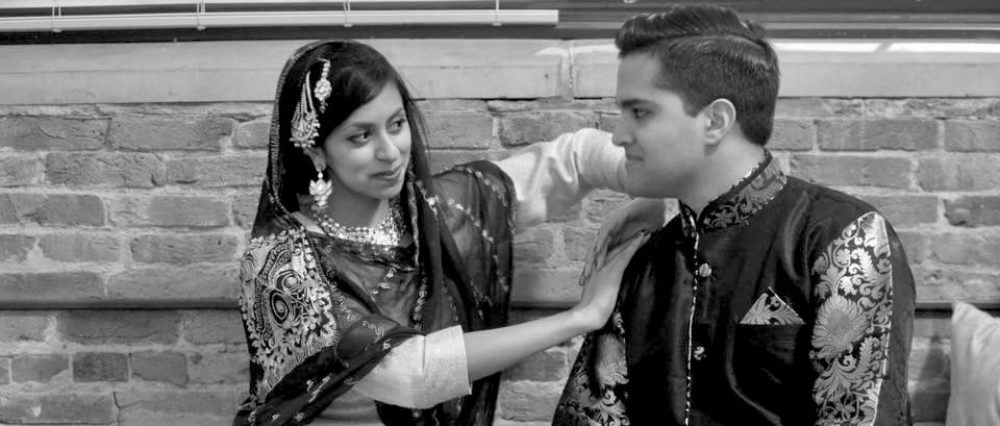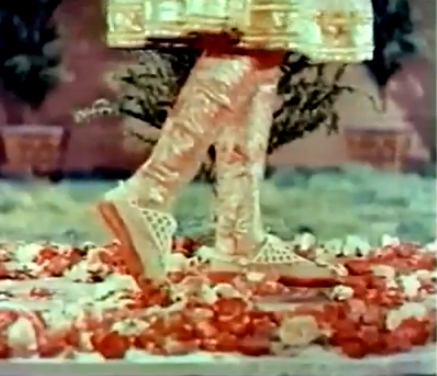Today we discuss the lyrics and English translation of “paaon choo lene do” from the film Taj Mahal (1963). Lyricist Sahir Ludhianvi and music director Roshan both won Filmfare Awards for their work in Taj Mahal (1963), so it’s not surprising that we’ve decided to discuss a third song from this soundtrack here today (see our previous translations of “jurm-e-ulfat pe” and “khudaa-e-bartar“). “paa.nv chuu lene do” is a duet rendered by Lata Mangeshkar and Mohammed Rafi that was picturized on Bina Roy as Mumtaz Mahal and Pradeep Kumar as Shah Jahan in the film. While “jurm-e-ulfat pe” had some political undertones and “khudaa-e-bartar” was a pacifist statement against war, Sahir’s lyrics in this song from Taj Mahal are purely romantic. The male and female leads flirt back and forth using a savaal-javaab (question-response) structure that focuses on idealizing the heroine’s feet. The female foot has been fetishized in Indian culture and Bollywood cinema over the years, and perhaps the most notable example of this phenomenon occurs in Kamal Amrohi’s magnum opus, Pakeezah: Raaj Kumar is completely smitten after one glance at Meena Kumari’s delicate feet during a train ride.

Krishna decorates Radha’s feet with alta.
What are the origins of the Indian obsession with the foot? Part of this obsession can perhaps be attributed to the importance placed on foot worship in Hindu traditions. For instance, religious imagery in temples and paintings has depicted numerous examples of Krishna painting Radha’s feet or Lakshmi massaging Vishnu’s feet. Moreover, it is a tradition for women in North India to adorn their feet with a bright red dye called alta during marriages, dances, and religious festivals, like Durga Puja. In fact, during some weddings, brides step into a plate of alta before entering their in-law’s house and leave colored footsteps behind them as they walk. Finally, any child growing up in a Hindu household can attest to the fact that greeting one’s elders by touching their feet is an expected gesture of respect.
Regardless of how you feel about feet, you should definitely take a listen to this duet from Taj Mahal and follow along with our translation/glossary provided below. Indeed, Ludhianvi’s use of language here to highlight the contrast between the hero’s unabashed romantic desires and the heroine’s hesistant modesty is exquisite. As a final note, I just wanted to say that this song was requested by one of our readers Vasuki! We love receiving requests, so please let us know if there is a song you’d like translated, a movie you’d like reviewed, or any other topic you’d like discussed by leaving us a comment here or sending an e-mail to themrandmrs55@gmail.com. Enjoy!
–Mr. 55
Paaon Choo Lene Do Lyrics and Translation
Rafi: paa.nv chhuu lene do, phuulo.n ko inaayat hogii
Please let the flowers touch your feet, it will be favor of kindess to them.
varnaa ham ko nahii.n, inko bhii shikaayat hogii
Or else, not only I, but they too will protest.
Lata: aap jo phuul bichhaaye.n unhe.n ham Thukaraaye.n
As I reject the flowers that you have picked for me,
ham ko Dar hai ki yah tauhiin-e-muhabbat hogii
I fear that this will be an insult to love.
Rafi: dil kii bechain umango.n pe karam faramaao
Please have mercy on the restless yearnings of my heart.
itnaa ruk ruk ke chalogii to qayaamat hogii
If you walk toward me so hesitatingly, it will be a disaster.
Lata: sharm roke hai idhar, shauq udhar khii.nche hai
Modesty has held me back here, while desire has drawn me over there.
kyaa khabar thii kabhii is dil kii yah haalat hogii?
Who knew that my heart would ever be in such a state?
Rafi: sharm ghairo.n se huaa kartii hai apano.n se nahii.n
One should be modest in the presence of strangers, not with loved ones.
sharm ham se bhii karogii to musiibat hogii
If you shy away from me, there will be trouble.
paa.nv chhuu lene do, phuulo.n ko inaayat hogii
Please let the flowers touch your feet, it will be favor of kindess to them.
Glossary
inaayat: favor; varnaa: or else; shikaayat: complaint; Thukaranaa: to reject; tauhiin-e-muhabbat: insult to love; bechain: restless; umang: hope, yearning; karam faramanaa: to have mercy; ruk ruk ke: hesitatingly; qayaamat: disaster; sharm: modesty; shauq: eagerness, desire; haalat: state, condition; ghair: stranger; musiibat: trouble




All the Taj Mahal songs are lovely…I especially love the lyrics of the qawwali ‘chandi ka badan sone ki nazar’.
Me too! It’s super long and complex, but I may try my hand at a translation soon…
–Mr. 55
Please do, I’m trying to get ne and it’s been the hardest thing! I like classic movies and I love love love seeing great love songs like this.
I have to say that sometimes I would hear Suman and swear it’s Lata, their voices are UNCANNILY SIMILAR. However, they both are amazing singers and I enjoy their singing very much, especially when I can get an English translation of the song so I can know what I’m singing lol
Beautiful lyrics and your translation does full justice! I’d like to share something else about the song with you guys:
“Stories abound on Roshan’s use of Lata’s voice in ‘Taj Mahal’. There is one that
he himself loved to narrate. The song “paaon chhoo lene do phoolon ko inaayat
hogi” was running way behind its recording schedule. Roshan himself fell ill
and had to be hospitalized, and just the day before the much awaited recording
session, Lata came down with a bad case of bronchitis. She called up the MD
and suggested postponing the scheduled recording by a couple of weeks. Roshan
was adamant. Then there were pressures from all sources. The one he resisted
the most was the idea that Suman should sing in Lata’s place. While Roshan
always enjoyed Suman’s singing, he refused to go back on the original decision.
Lata was duly summoned at the hospital. She would not say no to the maestro.
In the hospital ward, they mustered up whatever privacy they could, rehearsed
the song a few times, and under the circumstances, decided that this was the
best they could do. The recording took place the following day, as scheduled.”
Upon careful listening, the nasal congestion comes trough quite clearly when Lata sings “hum ko dar hai ki yeh tauheen-e-muhabbat hogi”.
Thanks for sharing, wasn’t aware of this particular story!
Pingback: Sansaar Se Bhaage Phirte Ho Lyrics and Translation: Let’s Learn Urdu-Hindi « Mr. & Mrs. 55 – Classic Bollywood Revisited!
Dear Mr and Mrs Pachapana
I love much what you do and i am a lover of shayr, ghazal and old indian music
Great job indeed
Thanks for this very beautiful song and translation
Please, ek fariyad hai:
Would you please translate the lyrics of the beautiful “Chandi ka badan sone ki nazar ” from the same movie ?
Chaandi kaa badan sone ki nazar
Us par ye nazaakat kyaa kahiye Eji kyaa kahiye
Kis kis pe tumhaare jalvo ne
Todi hai qayaamat kyaa kahiye Eji kyaa kahiye
Chaandi kaa badan sone ki nazar
Gustaakh zubaan gustaakh nazar
Ye range tabiyat kyaa kahiye Eji kyaa kahiye
Aise bhi kahi is duniyaa me
Hoti hai muhabbat kyaa kahiye Eji kyaa kahiye
Gustaakh zubaan gustaakh nazar
Aanchal ki dhanak ke saaye me
Ye phul gulaabi haaye gulaabi cheharo ke
Is vaqt hamaari nazaro me Kyaa chiz hai jannat kyaa kahiye
Eji kyaa kahiye
Tumase nazare jo mili Din o duniyaa se gaye
Ik tamannaa ke sivaa Har tamannaa se gaye
Mast aankho se jo pi Jaam o minaa se gaye
Zulf laharaai jahaan Ham bhi laharaa se gaye
Hure milati hai kise Is ki paravaah se gaye
Is vaqt hamaari nazaro me Kyaa chiz hai jannat kyaa kahiye
Eji kyaa kahiye
Chaandi kaa badan sone ki nazar
Yun garm nigaahe mat daalo
Ye jism pighal bhi pighal bhi sakate hai
Ude na kahi rup ki shabanam
Garm nigaahe daalo kam kam
Aadaab e nazaaraa bhule ho
Tum logo ki vahashat kyaa kahiye Eji kyaa kahiye
Tum hame jit sako Is kaa imkaan nahi
Khhud ko badanaam kare Ham vo naadaan nahi
Koi marataa hai mare Ham pe ehasaan nahi
Un se kyun baat kare Jin se pahachaan nahi
Tum ko aramaan hai to hai Ham ko aramaan nahi
Ham ko aramaan ke aramaan ke aramaan nahi
Aadaab e nazaaraa bhule ho
Tum logo ki vahashat kyaa kahiye Eji kyaa kahiye
Chaandi kaa badan sone ki nazar
Din raat duhaai dete hai Ye haal hai in divaano kaa
Jahaan dekhi nai surat machal baithe
Ye haal hai in divaano kaa divaano kaa
Jin ki khhaatir gam sahe aur ro-ro jaan gavaayen
Haay ri qismat uhi ke munh se divaane kahalaayen
In aashiqo ke haath se Ai zindagi bavaal
In kaa kare khhayaal ke Apanaa kare khhayaal
Har lab arz e shauq to Har aankh hai savaal
Ye gam se beqaraar hai Vo dard se nidhaal
Arey ye haal hai in divaano kaa
Meri nind gai meraa chain gayaa
Vo jo pahale thi taab o tabaan gai
Yahi rang rahaa yahi dhang rahaa
To ye jaan lo jaan ki jaan gai
Ye haal hai in divaano kaa
Kisi ko khhud khhushi kaa, shauq ho to, kyaa kare koi
Davaa e hijr de, bimaar ko, achchhaa kare koi
Koi bevajah sar phode to kyo paravaah kare koi
Kisi majabur e gam kaa haal kyo aisaa kare koi
Mazaa to hai ke jab tum, Tum tadapaa karo,
Dekhaa kare koi
Mare ham aur tum par, Ke tum par khhun kaa
Daavaa kare koi
Haan, daavaa kare koi
Ye haal hai in divaano kaa, divaano kaa
Jite bhi nahi marate bhi nahi
Bechaaro ki haalat kyaa kahiye Eji kyaa kahiye
Gustaakh zubaan gustaakh nazar.
Thanks in advance
Pingback: Jo Wada Kiya Woh Nibhana Padega Lyrics and Translation: Let’s Learn Urdu-Hindi | Mr. & Mrs. 55 - Classic Bollywood Revisited!
Please include ‘Jo Baat Tujhme Hain Teri Tasveer Mein Nahi’ from this movie as well. Thanks.
sahir (who never married) was surprisingly, a romanticist————-listening to his numbers in most of yash and BR films (dhool ka phool, hamraaz, waqt, gumrah and latterly, daag and daastaan)————then kabhi kabhi and neel kamal, and the excellent
“tujhko pukaare mera pyaar”-one gets the feel that he may have had a real disappointment in life.
Sahir remained a bachelor to the end. He was in love with a girl and all these beautiful songs were attributed to her but had he married her we would have been deprived of these songs!